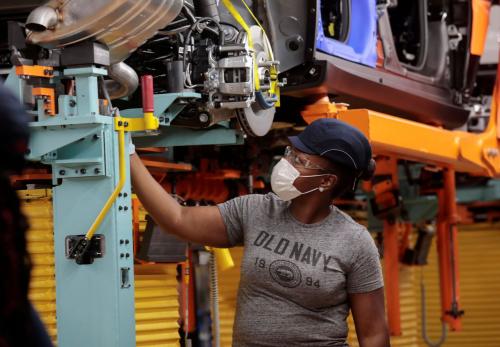This viewpoint is part of Chapter 1 of USMCA Forward 2025, which focuses on areas where deepening cooperation between the United States, Mexico, and Canada can help advance key economic and national security goals.
In recent years, a variety of disruptive global forces—including the COVID19 pandemic, heightened geopolitical tensions, rising protectionism, and climate change—have shifted the way that we think about international trade. As governments and businesses around the world navigate an increasingly fragmented and complex international landscape, economic security and resiliency have emerged as major priorities for policymakers.
For Canada, the U.S., and Mexico, the increasingly uncertain international environment presents risks, but it also offers a critical opportunity.
The United States-Mexico-Canada Agreement (USMCA) has expanded and modernized the provisions of the North American Free Trade Agreement (NAFTA), providing a stable and predictable framework for trade and investment within North America. Since coming into effect in 2020, there has been a remarkable 47% increase in trade within North America. This growth has positioned Mexico and Canada as the top two trading partners of the U.S. with both countries outpacing U.S.’ trade with China in 2023 as well as in 2024.
The three North American countries, as members of one of the world’s largest and most comprehensive trading bloc, are ideal partners for collaboratively addressing the shared economic and national security challenges that we face. Such challenges—ranging from supply chain disruptions, skills gaps in our workforces, to risks posed by new and emerging digital threats—weaken the resilience of the North American economies as well as our competitiveness on the global stage.
As we approach the 2026 review of the USMCA, Canada, the U.S., and Mexico should aim to adopt a robust North American economic security agenda. To be clear, although preserving the provisions of the USMCA should be a key priority for all three governments, the 2026 review also presents an opportunity to move beyond the status quo when it comes to the security and prosperity of the continent.
Establishing a North American economic security agenda
China’s recent export restrictions on critical minerals targeting the U.S. demonstrates why resilient North American supply chains are important. As part of a series of tit-for-tat measures between China and the U.S., the latest restrictions seek to curb China’s exports of gallium, germanium, and antimony to the U.S. These are important inputs for defense technologies, semiconductors, solar cells, and other advanced technologies—all of which are vital to U.S. national security.
Canada’s natural resource wealth presents an obvious solution to the overreliance on China and other non-market economies for critical minerals. According to the U.S. Department of Defense’s June 2021 review of U.S. critical minerals supply chains, Canada has substantial resource potential for supplying U.S. demand for more than twenty strategic and critical minerals.
Canadian companies are well placed to meet the growing U.S. demand for a sustainable and reliable source of critical minerals. In fact, Vancouver-based metals producer Teck Resources Ltd., one of the world’s largest integrated germanium producers, is already examining options for increasing their production capacity of germanium in response to China’s latest export restrictions.
To mitigate such vulnerabilities in regards to critical minerals supply chains as well as other strategic areas, the three governments should leverage their partnership to establish a renewed North American economic security agenda. As a starting point, this should include the following key measures.
The USMCA Competitiveness Committee should play a more significant role in advancing a cohesive and strategic competitiveness agenda for North America. In particular, the committee should prioritize fostering resilient and competitive North American supply chains that are critical for preserving North American economic security. Key supply chains for the committee’s consideration should include automotive, aerospace and defense, critical minerals, energy, and life sciences.
The USMCA Competitiveness Committee should play a more significant role in advancing a cohesive and strategic competitiveness agenda for North America. In particular, the committee should prioritize fostering resilient and competitive North American supply chains that are critical for preserving North American economic security.
Canada, the U.S., and Mexico, should prioritize strengthening cooperation and coordination on policy responses to unfair trade practices by China, as well as other non-market economies. While all three countries committed to jointly expanding collaboration on these matters at the fourth annual meeting of the USMCA Free Trade Commission, more deliberate and concrete action is required. As a first step, the three countries should coordinate efforts to address unfair trade practices related to electric vehicles (EVs), as well as risks posed by certain connected vehicles. While both Canada and the U.S. have acted on the risks posed by Chinese EVs, greater coordination and alignment with Mexico is needed.
Given our closely aligned economic and security interests, Canada and the U.S should develop a new bilateral pact to advance common economic security interests. This pact should seek to enhance Canada-U.S. cooperation on economic security, building upon key bilateral initiatives such as the 2021 Roadmap for a Renewed U.S.-Canada Partnership. This new measure should be complementary to existing provisions of the USMCA and should be viewed as a model partnership that can eventually be expanded to include Mexico.
Toward a more prosperous and secure North America
The future of the North American economic partnership is increasingly uncertain as we approach the 2026 USMCA review.
Rather than turning inwards, erecting trade barriers, or implementing counter-productive tariffs, Canada, the U.S., and Mexico should instead lean into the North American economic partnership, creating the conditions to unleash the full potential of our industries.
This means not only enhancing trade within North America, but also taking security considerations seriously—including those pertaining to our borders. Notably, Canada’s 2024 Fall Economic Statement outlines the government’s plans for a $1.3 billion investment to enhance the security of the Canada-U.S. border.
For Canadian businesses, enhancing North American economic cooperation and a successful 2026 USMCA review are top priorities. In 2024, the Canadian Chamber organized multiple business-led trade missions to the U.S. on key areas where there are significant opportunities for shared growth. These missions have focused on critical minerals, life science supply chain resiliency, North American economic security, and artificial intelligence. Through these missions, Canadian businesses are proactively engaging with policymakers, businesses, and the wider North American public policy community to strengthen North American economic cooperation.
Given Canada will Chair the upcoming USMCA Free Trade Commission meeting, and also holds the G7 Presidency in 2025, Canada has a unique opportunity to take a leadership role on these matters in the coming year.
The Canadian Chamber of Commerce, as the voice of the business community in Canada and host organization for B7 2025, is committed to collaborating with all three governments, as well as the business communities from all three countries. Working together, industry and government can create the conditions for a more secure and prosperous North America.
The Brookings Institution is committed to quality, independence, and impact.
We are supported by a diverse array of funders. In line with our values and policies, each Brookings publication represents the sole views of its author(s).






Commentary
Setting a North American economic security agenda
March 5, 2025